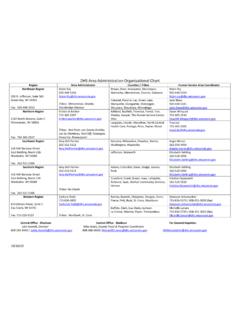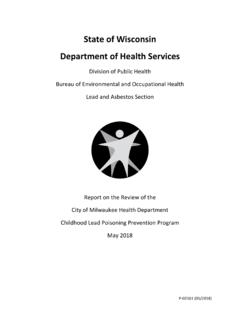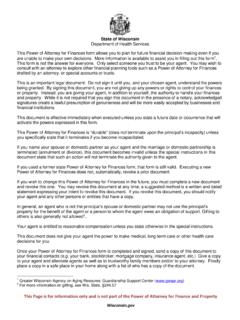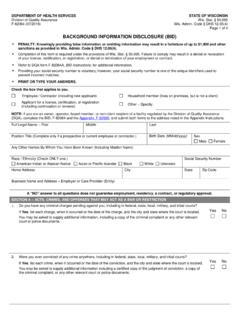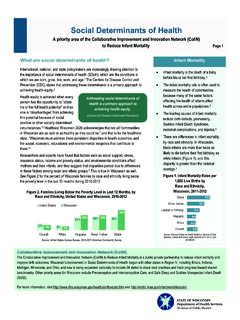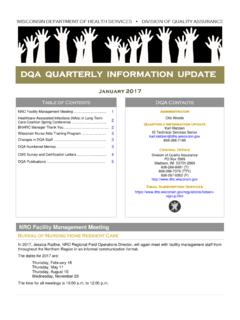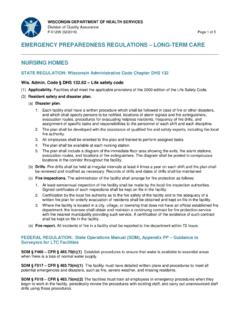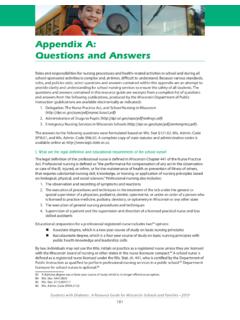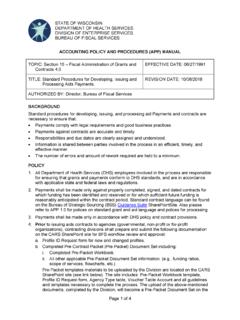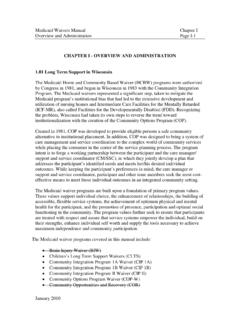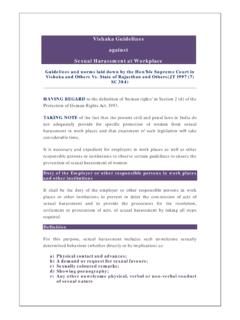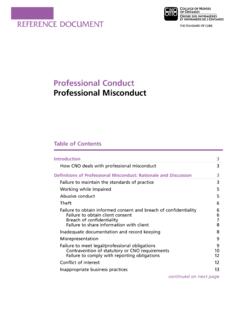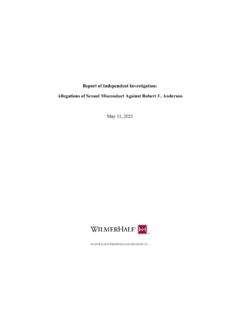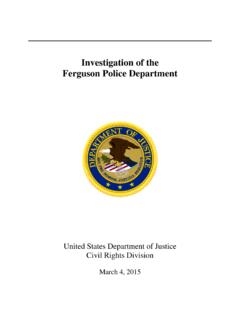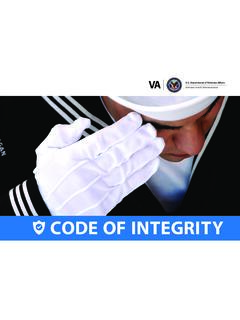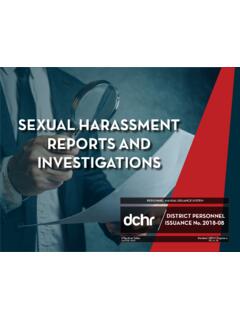Transcription of MISCONDUCT DEFINITIONS Wisconsin Department of …
1 1 MISCONDUCT DEFINITIONS Wisconsin Department of Health Services / Division of Quality Assurance P-00976 (11/2017) Federal requirements under 42 CFR and state law under Wisconsin Administrative Code, Chapter DHS 13 establish reporting and investigation requirements of caregiver MISCONDUCT for both nursing homes and for all other entities regulated by the Division of Quality Assurance. Each resident has the right to be free from abuse, corporal punishment, and involuntary seclusion. Residents must not be subjected to abuse by anyone, including but not limited to facility staff, other residents, consultants or volunteers, staff of other agencies serving the resident, family members or legal guardians, friends, or other individuals.
2 The purpose of this publication is to provide a comparison of federal DEFINITIONS of MISCONDUCT under 42 CFR and state DEFINITIONS under ch. DHS 13. Participating Medicare and Medicaid nursing homes must first review the federal DEFINITIONS ; if an incident potentially meets the federal definition, it is not necessary to review the state DEFINITIONS found in DHS Code of Federal Regulations 42 CFR Wis. Admin. Code Chapter DHS 13 Caregiver MISCONDUCT DEFINITIONS ABUSE ABUSE Abuse is defined as the willful infliction of injury, unreasonable confinement, intimidation or punishment with resulting physical harm, pain, or mental anguish.
3 This includes the deprivation by an individual, including a caretaker, of goods or services that are necessary to attain or maintain physical, mental, and psychosocial well-being. Instances of abuse of all residents, irrespective of any mental or physical condition, cause physical harm, pain, and mental anguish. It includes verbal abuse, sexual abuse, physical abuse, and mental abuse, including abuse facilitated or enabled through the use of technology. Willful, as used in this definition of abuse, means that the individual must have acted deliberately, not that the individual must have intended to inflict injury or harm.
4 Verbal Abuse involves the use of speech, sound, writing, or gestures when communicating with residents or their families or when within their hearing or sight, regardless of their age, ability to comprehend, or disability. Examples include, but are not limited to threats of harm or frightening a resident ( , telling a resident that he/she will never be able to see his/her family again). sexual Abuse is the non-consensual sexual contact of any type with a resident. sexual abuse includes, but is not limited to sexual harassment, sexual coercion, or sexual assault. Physical Abuse includes, but is not limited to hit ting, slapping, punching, biting, and kicking.
5 It also includes controlling behavior through corporal punishment. Mental Abuse is the use of verbal or nonverbal conduct which causes, or has the potential to cause, the resident to experience humiliation, intimidation, fear, shame, agitation, or degradation. Note that the federal definition of abuse indicates that the act needs to be "willful" and that it needs to have resulted in physical or psychosocial harm to the resident or --- if the resident cannot provide a response --- would be expected to have caused harm to a "reasonable person." For a definition of "willful," refer to the interpretive guidelines at F689 where, under Resident-to-Resident Altercations, it notes: "A resident-to-resident altercation should be reviewed as a potential situation of abuse which should be investigated under the guidance for 42 CFR Abuse is defined as: 1.
6 An act or repeated acts by a caregiver or non-client resident, including but not limited to restraint, isolation, or confinement that, when contrary to the entity s policies and procedures, not a part of the client s treatment plan and done intentionally to cause harm, does any of the following: a. Causes or could be reasonably expected to cause pain or injury to a client or the death of a client and the act does not constitute self defense as defined in Wis. Stat. b. Substantially disregards a client s rights under Wis. Stat. chs. 50 or 51, or a caregiver s duties and obligations to a client.
7 C. Causes or could reasonably be expected to cause mental or emotional damage to a client, including harm to the client s psychological or intellectual functioning that is exhibited by anxiety, depression, withdrawal, regression, outward aggressive behavior, agitation, or a fear of harm or death, or a combination of these behaviors. This subdivision does not apply to permissible restraint, isolation, or confinement implemented by order of a court or as permitted by statute. 2. An act or acts of sexual intercourse or sexual contact under Wis. Stat. , by a caregiver and involving a client 3. The forcible administration of medication or the performance of psychosurgery, electroconvulsive therapy, or experimental research on a client with the knowledge that no lawful authority exists for the administration or performance 4.
8 A course of conduct or repeated acts by a caregiver which serve no legitimate purpose and which, when done with intent to harass, intimidate, humiliate, threaten, or frighten a client, causes or could be reasonably expected to cause the client to be harassed, intimidated, humiliated, threatened, or frightened Examples of abuse include, but are not limited to: Physical Abuse Hitting, slapping, pinching, kicking, or intentionally causing harm 2 Code of Federal Regulations 42 CFR Wis. Admin. Code Chapter DHS 13 Caregiver MISCONDUCT DEFINITIONS (F600). Willful means that the individual intended the action itself, regardless of whether or not the individual intended to inflict injury or harm.
9 Even though a resident may have a cognitive impairment, he/she could still commit a willful act". sexual Abuse Harassment, inappropriate touching, or assault Verbal Abuse Threats of harm, saying things to intentionally frighten a client Mental Abuse Humiliation, harassment, and intimidation with threats of punishment or threats of depriving care or possessions Abuse does not include an act or acts of mere inefficiency, unsatisfactory conduct, or failure of good performance as the result of inability, incapacity, inadvertency, or ordinary negligence in isolated instances, or good faith errors in judgment or discretion.
10 NEGLECT NEGLECT Neglect is defined as the failure of the facility, its employees, or service providers to provide goods and services to a resident that are necessary to avoid physical harm, pain, mental anguish, or emotional distress. Neglect is defined as an intentional omission or intentional course of conduct by a caregiver or a non-client resident, including but not limited to restraint, isolation or confinement, that is contrary to the entity s policies and procedures, is not part of the client s treatment plan and, through substantial carelessness or negligence, does any of the following: Causes or could reasonably be expected to cause pain or injury to a client or the death of a client Substantially disregards a client s rights under either Wis.
